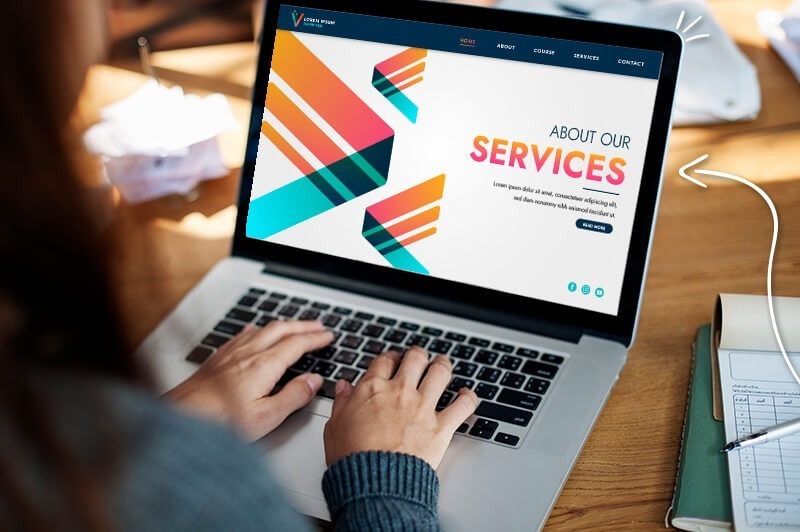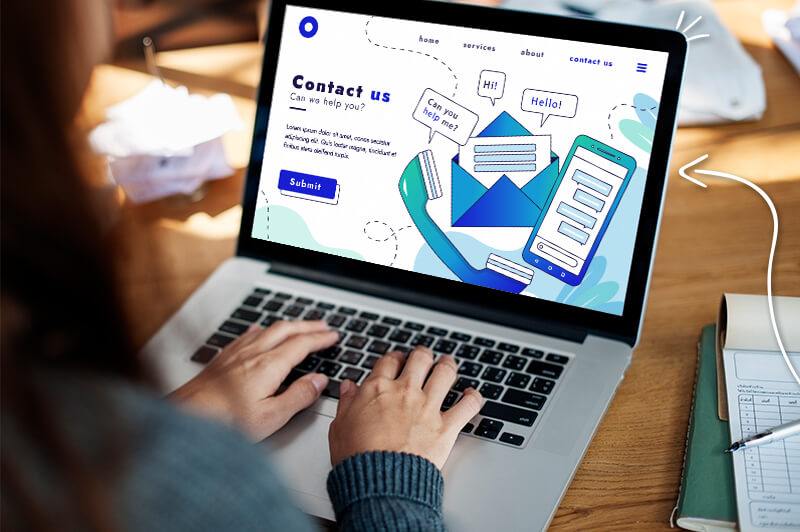
You have a product or service and all you want to do is launch it. Whether it’s due to budget or time constraints, you need just the bare minimums on your website to start your business. We’ve all been there.
But what are the bare minimums? While you may think the check-out cart is enough to make a sale, trust me, it isn’t. In this article, I’m going to show you the bare essentials your website needs to convert traffic into sales.
In this article, I’ll be using some industry terms. And as a small business, eventually, you’ll be seeing these terms more and more as you grow. So, you might as well learn what they are now!
Brand identity: the visible elements of your brand which include color, logo, theme, and design. These elements create your brand identity.
Organic traffic: the visitors that land on your website from an unpaid source, such as a search engine like Google. Other organic sources can be Bing or Yahoo.
SEO: Search engine optimization (SEO) is the process of gaining organic (free) traffic from search engines. It helps to improve a website’s positioning on search engines.
Value proposition: tells customers why they should do business with you rather than your competitors. For example, Slack’s value proposition is to “be more productive at work with less effort.”
I know you’ve probably thought about whether or not your small business needs a website, especially if you’re just starting out. And while you can get away with growing your small business without a website, your online presence greatly impacts your business’s success.
Before I share with you the essentials your website needs, it’s crucial to understand why having a website is so important for your small business.
Eighty-one percent of customers will research a product before buying it. See, having a website isn’t a surprise for your customers, it’s expected.
A website is more than just a place to make a sale, it’s where you show customers who you are, what your business provides, and why they should choose you.
You don’t want to look like your business runs out of your garage (even if it does). Of course, you want your business to look professional. To do that, you need a website.
Eighty-four percent of today’s consumers believe a website makes your business look more credible, so the proof is in the numbers.
Your business’s website is a space where you can showcase your products or services and additional elements like awards or certifications to add an extra level of professionalism.
A business website helps to reflect your brand identity to potential and returning customers.
Through the various pages on your website, you can build your brand’s reputation and express your brand’s value proposition.
When you want to buy something online, where do you go? Google. And your customers aren’t any different. When your website is live and SEO-optimized, you have a significant chance of showing up on Google. And Google is where you want your business to be.
When a customer searches for a product or service, your business will appear in the results. Through organic traffic, you increase your business’s visibility by continuing to appear on the search engine, thus building an organic customer base.
One of the main reasons you should have a website is to increase the credibility of your business. Having a website is the first step in showing customers you’re serious and legitimate.
As a small business, you’re a small fish swimming in a large ocean, so you need to show potential customers they should choose your products or services over other brands.
Having a social media presence or 5-stars on Yelp isn’t enough (though it does help, I admit).
Customers expect to see your website for more information about your brand. Your website provides them with additional social proof and builds your credibility.
If someone doesn’t like your product or service, they’re going to talk about it online. That’s just the way it is in today’s world.
And while you can’t control what other people say about your business online, you can control the narrative on your website.
All the big businesses in your industry have websites – all of them. And while you may think you don’t stand a chance against them, when you have a website, you do.
If your optimized website ranks on search engines, you increase your chances of being seen by potential customers.
Facebook lost around 500,000 daily users in the last three months of 2021. Now, this doesn’t mean social media isn’t important, it is.
However, as a small business, you shouldn’t be relying solely on social media to get the job done. While people may not be using social media as much, they still Google. And that’s why you need a website.
You know why your business needs a website and you’re ready to get started. But you either don’t have the time or budget to create an elaborate website – I totally understand. So what are the bare essentials to include on your website?

You’d be surprised by how many people actually read the About Us page. It’s one of the first places new visitors go to when wanting to learn more about your brand. From there, they decide whether they want to invest in your brand or not. Your About Us page can make or break a sale.
To have an About Us page that speaks to your customers, include the following:
Mission statement: your mission statement should be one sentence that tells your customer how your business can help them. For example, if you’re a yoga business, your mission statement could be “I help women and men bring calmness and internal peace into their lives.”
Your story: This includes a couple of things: why your company exists, how you started your business, any relevant experience you have, and how your business brings value to your customers.
Call to Action (CTA): a CTA is a button, link, or statement that tells the customer what to do next. For example, a CTA could be a button that says “signup” or “book your free consultation.”
Photos: who doesn’t like looking at photos? Bring life to your business by showing the face(s) behind it. Plus, it’ll help build credibility and brand trust.
Below is an example of Newton Supply Co., a small business with a killer About page.
Newton Supply Co. is a small business that manufactures locally sourced handbags and printed accessories. Their About Us page includes a mission statement, their story, and the causes they’ve partnered with.
In addition, you see behind-the-scenes photos including the faces of their small business and a CTA “subscribe” at the bottom of the page. It’s simple, nothing fancy, but ticks everything off the list.


Your product/services page shows customers what you have to offer them. Whether you’re selling products or services on this page, you should offer a couple of different options for your customers – people like options.
On this page, you should include:
Products/services: What would this page be if it didn’t include your products/services. Make sure to include a product/service description and the price.
Testimonials: Before making a purchase, people want to know if your product/service is worth the money. That’s when testimonials come in. The best and easiest way to gain credibility and trust is through testimonials. Include a couple of testimonials from previous clients and if possible, includes photos as well.
Call to Action (CTA): And, of course, always include a CTA. A CTA on your products/service page could be an “add to cart” or “book now” button. This will encourage customers to take the next step.
Below is an example of Silk & Willow, a small business with a great product page.
Silk & Willow is a small business that specializes in making ethical and natural textiles. Their product page is simple and gets in everything a customer needs to see.
Their call to action “add to cart” is clearly placed next to the product image. The product description sits neatly under the CTA and as we go down the page, you see an ample number of product reviews.




If someone has a question, where do they go on your website to ask? To the Contact Us page. You want to make sure that anyone can easily reach out to you.
Make sure to include the following:
Your primary contact: give them the main way they can contact you. This can be a contact form or your email address. What’s important is that it’s highly visible on the Contact Us page.
Social media: provide them with alternative ways to contact you such as your social media profiles. Your customer may not be ready to make a sale, but they’ll follow you online which gives you ample opportunity to reach out to them.
Your credentials or photo: If someone is going through the act of contacting you, then they’re most likely serious about buying your product or service. To gain extra credibility and trust, add your photo or credentials to the page.
Leif is an online lifestyle shop that celebrates everyday beauty. When going on their Contact Us page, you see they include everything you need to contact them.
They include various options to contact them, as well as a contact form at the bottom of the page. It’s simple and clean, and everything you need.
Below is an example of Leif, a small business with a valuable Contact page.

It’s easy to become overwhelmed with the idea of building a website, but it doesn’t have to be that hard.
With time, you can add more information onto your website and slowly build it up. What’s important is when launching your business you have these essential elements on your website.
This portion of our website is for informational purposes only. Tailor Brands is not a law firm, and none of the information on this website constitutes or is intended to convey legal advice. All statements, opinions, recommendations, and conclusions are solely the expression of the author and provided on an as-is basis. Accordingly, Tailor Brands is not responsible for the information and/or its accuracy or completeness. It also does not indicate any affiliation between Tailor Brands and any other brands, services or logos.
Products
Resources
@2024 Copyright Tailor Brands